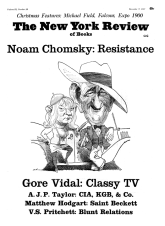In response to:
Dept. of Amplification from the November 23, 1967 issue
To the Editors:
In his letter to The New York Review of Books (November 23, 1967), Arthur I. Waskow complains, among other things, that The New Yorker publishes no letters of factual correction. This is about as accurate as his account of the New Politics convention. The New Yorker has published dozens of letters of correction, and will presumably publish others. The point is that in Mr. Waskow’s case there was nothing to correct.
Mr. Waskow now describes himself as having resolutely opposed endorsement of the thirteen Black Caucus proposals. The opening words of a statement which he drew up at the time, and which he apparently regards as having expressed that vigorous opposition, read as follows:
BE IT RESOLVED that the resolutions proposed to us be accepted as one document of this convention.
It is this initial endorsement that he was presumably arguing for when he told several delegations in the plenary that their opposition to the substance of any of the proposals was “irrelevant”; the statement went on with a few generalities, none of which in any way contradicted or altered the endorsement. Moreover, far from mentioning the word or thought “bicameral,” the statement stressed that all work of the convention should be done “jointly by blacks and whites, and to that end we now double in size every committee of this convention.” “To accept” is apparently not, in Mr. Waskow’s view, to endorse. “Jointly,” however, means in separate chambers.
So much for the factual part., My general point was, of course, that to act upon any set of proposals not on the basis of their content but on the basis of the race of the proposers is an act of racism. That seems to me to hold as true for Mr. Waskow’s afterthoughts as for his point of view at the convention. (The point of view itself has undergone several transformations: in a mimeographed report after the convention, Mr. Waskow wrote that he had only wanted the convention “to adopt” the thirteen proposals as “a legitimate statement of one wing of the movement.” To adopt as legitimate is still, in English anyway, to endorse, but the parliamentary maneuver acquires more radical finesse every time Mr. Waskow revises it.) In short, The New Yorker relied not only upon its reporter but upon statements Mr. Waskow wrote and distributed in Chicago. And while it is true, for good or ill, that The New Yorker does not run a conventional letters column, it does run Letters of Correction and Letters of Amplification. Not yet, however, a continuing feature called Arrières Pensées of Arthur I. Waskow.
Renata Adler
New York City
This Issue
December 7, 1967



